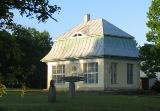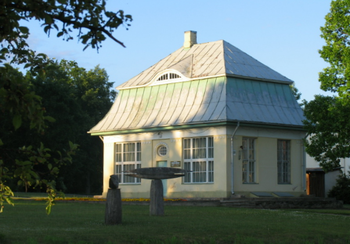
Johann Ernst Glück
Encyclopedia

Translation
Translation is the communication of the meaning of a source-language text by means of an equivalent target-language text. Whereas interpreting undoubtedly antedates writing, translation began only after the appearance of written literature; there exist partial translations of the Sumerian Epic of...
and Lutheran
Lutheranism
Lutheranism is a major branch of Western Christianity that identifies with the theology of Martin Luther, a German reformer. Luther's efforts to reform the theology and practice of the church launched the Protestant Reformation...
theologian
Theology
Theology is the systematic and rational study of religion and its influences and of the nature of religious truths, or the learned profession acquired by completing specialized training in religious studies, usually at a university or school of divinity or seminary.-Definition:Augustine of Hippo...
active in Livonia
Livonia
Livonia is a historic region along the eastern shores of the Baltic Sea. It was once the land of the Finnic Livonians inhabiting the principal ancient Livonian County Metsepole with its center at Turaida...
, which is now in Latvia
Latvia
Latvia , officially the Republic of Latvia , is a country in the Baltic region of Northern Europe. It is bordered to the north by Estonia , to the south by Lithuania , to the east by the Russian Federation , to the southeast by Belarus and shares maritime borders to the west with Sweden...
.
Glück was born in Wettin
Wettin, Saxony-Anhalt
Wettin is a small town and a former municipality in the Saalekreis district of Saxony-Anhalt, Germany, situated on the River Saale north of Halle. Since 1 January 2011, it is part of the town Löbejün-Wettin. It is known for Wettin Castle, the ancestral seat of the House of Wettin, ruling dynasty of...
as the son of a pastor. After attending the Latin
Latin
Latin is an Italic language originally spoken in Latium and Ancient Rome. It, along with most European languages, is a descendant of the ancient Proto-Indo-European language. Although it is considered a dead language, a number of scholars and members of the Christian clergy speak it fluently, and...
school of Altenburg
Altenburg
Altenburg is a town in the German federal state of Thuringia, 45 km south of Leipzig. It is the capital of the Altenburger Land district.-Geography:...
, he studied theology, rhetoric
Rhetoric
Rhetoric is the art of discourse, an art that aims to improve the facility of speakers or writers who attempt to inform, persuade, or motivate particular audiences in specific situations. As a subject of formal study and a productive civic practice, rhetoric has played a central role in the Western...
, philosophy
Philosophy
Philosophy is the study of general and fundamental problems, such as those connected with existence, knowledge, values, reason, mind, and language. Philosophy is distinguished from other ways of addressing such problems by its critical, generally systematic approach and its reliance on rational...
, geometry
Geometry
Geometry arose as the field of knowledge dealing with spatial relationships. Geometry was one of the two fields of pre-modern mathematics, the other being the study of numbers ....
, history
History
History is the discovery, collection, organization, and presentation of information about past events. History can also mean the period of time after writing was invented. Scholars who write about history are called historians...
, geography
Geography
Geography is the science that studies the lands, features, inhabitants, and phenomena of Earth. A literal translation would be "to describe or write about the Earth". The first person to use the word "geography" was Eratosthenes...
, and Latin at Wittenberg
Wittenberg
Wittenberg, officially Lutherstadt Wittenberg, is a city in Germany in the Bundesland Saxony-Anhalt, on the river Elbe. It has a population of about 50,000....
and Jena
Jena
Jena is a university city in central Germany on the river Saale. It has a population of approx. 103,000 and is the second largest city in the federal state of Thuringia, after Erfurt.-History:Jena was first mentioned in an 1182 document...
.
Glück is known for translating the Bible into Latvian
Bible translations into Latvian
The Lutheran pastor Johann Ernst Glück translated the Bible into the Latvian language in 1685. This translation was republished many times, repeatedly re-edited. Most recently a revision was begun in 1931 and printed in 1965 by the United Bible Societies, London. For this the main language editor...
, which he carried out in its entirety in Marienburg (Alūksne)
Aluksne
Alūksne is a town on the shores of Lake Alūksne in northeastern Latvia near the borders with Estonia and Russia. It is the seat of Alūksne municipality.- History :...
in Livonia, in the building now the Alūksne Museum
Aluksne Museum
Alūksne Bible Museum is a Latvian Christian museum in Alūksne in Latvia. It was in this place that Johann Ernst Glück famously translated the Holy Bible into the Latvian language. It is now designated as a museum to honour his work....
, established to honour his work. He also founded the first Latvian language schools in Livonia in 1683. He died in Moscow
Moscow
Moscow is the capital, the most populous city, and the most populous federal subject of Russia. The city is a major political, economic, cultural, scientific, religious, financial, educational, and transportation centre of Russia and the continent...
.
He had four daughters, a son, and a foster-daughter Marta Skavronska who married Peter I
Peter I of Russia
Peter the Great, Peter I or Pyotr Alexeyevich Romanov Dates indicated by the letters "O.S." are Old Style. All other dates in this article are New Style. ruled the Tsardom of Russia and later the Russian Empire from until his death, jointly ruling before 1696 with his half-brother, Ivan V...
and is mainly known as Catherine I
Catherine I of Russia
Catherine I , the second wife of Peter the Great, reigned as Empress of Russia from 1725 until her death.-Life as a peasant woman:The life of Catherine I was said by Voltaire to be nearly as extraordinary as that of Peter the Great himself. There are no documents that confirm her origins. Born on...
. From 1725 until 1727 she was empress of Russian Empire
Russian Empire
The Russian Empire was a state that existed from 1721 until the Russian Revolution of 1917. It was the successor to the Tsardom of Russia and the predecessor of the Soviet Union...
.
Bibliographie
- "Mach dich auf und werde licht - Celies nu, topi gaiss" - Zu Leben und Werk von Ernst Glück (1654-1705). Akten der Tagung anlässlich seines 300. Todestages vom 10. bis 13. Mai 2005 in Halle (Saale). Herausgegeben von Schiller, Christiane / Grudule, Mara. Wiesbaden, Harrasowitz, 2010.

